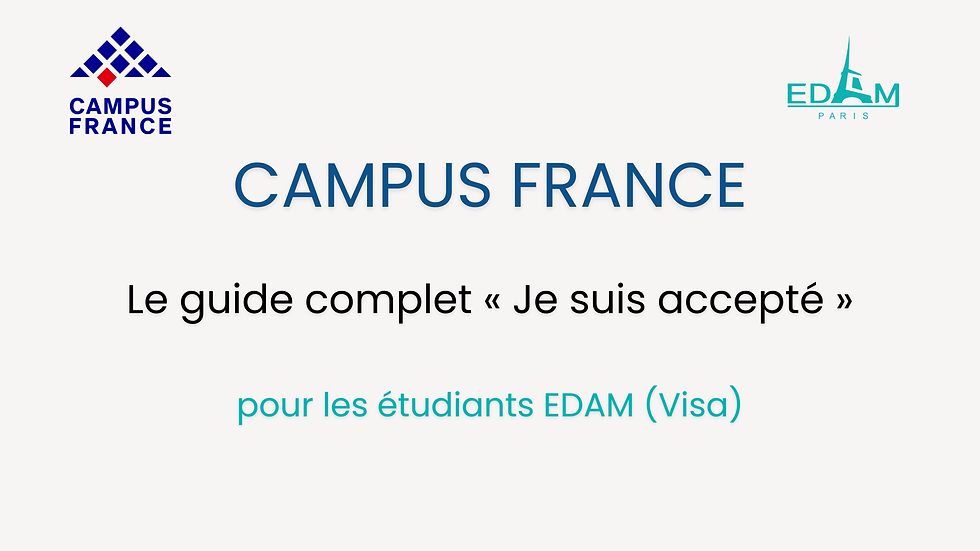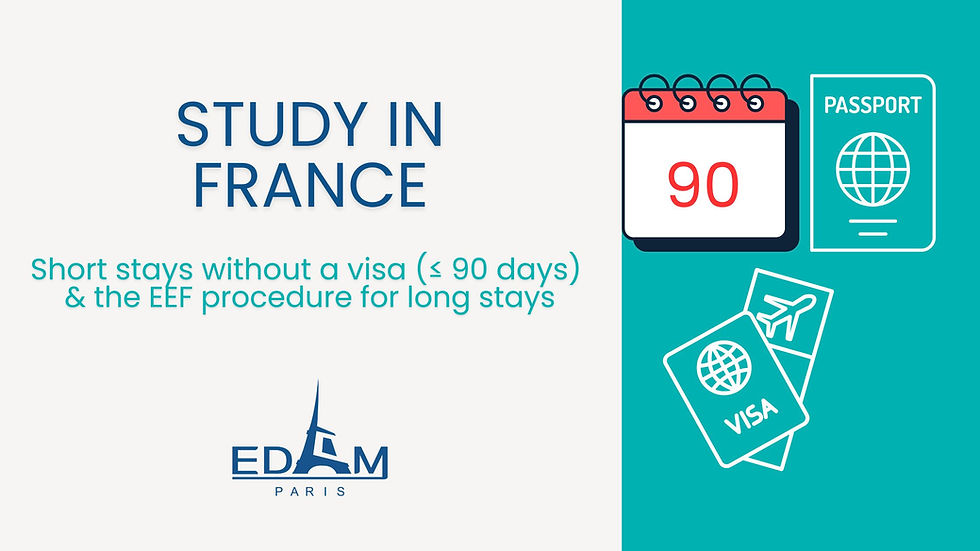French Exams Explained — TCF, TEF, DELF & DCL Compared
- EDAM Paris
- Sep 21, 2025
- 4 min read
Updated: Sep 23, 2025

How to Choose Your French Exam: TCF / TEF / DELF–DALF / DCL — One-Stop Guide (uses · sections · timing · difficulty)
Many people need proof of French level for residence/naturalization, study, or work, but aren’t sure which exam to take. This simple guide starts with use cases, then covers sections and timing, and finishes with a quick decision table—no jargon.
Which exam fits which profile?
Your need / profile | Recommended exam | Why | Prep focus |
Submit quickly (residence/naturalization) | TCF IRN or TEF IRN | Designed for integration/residence/nationality; all 4 skills same day; fast results; valid 2 years | Functional communication for admin & everyday life; in MCQs: key-word spotting → eliminate contradictions; short, well-structured writings |
Already working, comfortable with emails/meetings | DCL FLE | Work-task diploma; assigns A2→C1 in one sitting; accepted for procedures | Pipeline read → write → report orally; clarity, feasibility, professional tone |
Base faible, viser d’abord A2/B1 administratif | DELF A2 / B1 (or IRN) | DELF A2/B1 often accepted by authorities, valid for life; if time is short: IRN | Communicative functions, pass thresholds, automatize patterns |
Academic value / structured pathway | DELF B2 / DALF C1–C2 | Lifetime diplomas, highly recognized by universities/employers | Argumentation (written/oral), connectors, accuracy |
Canada / Québec | TCF/TEF Canada ; TEFAQ/TCF Québec | Aligned to CLB/Québec grids | Train exactly to the target band descriptors |
💡 Reminder: For procedures in France, DELF/DALF (at the required level) and DCL can also serve as language proof, not only IRN.
What does each exam look like? (sections · timing · difficulty)
TCF / TEF — Placement-style tests (valid 2 years)
TCF IRN (integration, residence, nationality)
Indicative timing: Listening ≈ 20′ (25 items); Reading ≈ 35′ (25); Writing ≈ 30′ (3 tasks); Speaking ≈ 10′ — all four skills on the same day.
Typical challenges: Tight timing, dense information; in writing/speaking you’re assessed on clear, efficient communication.
TCF TP (general use/study)
Indicative timing: Listening ≈ 25′ (29); Structures ≈ 15′ (18); Reading ≈ 45′ (29); options Writing ≈ 60′ (3) / Speaking ≈ 12′.
Challenges: Scanning longer texts, grammatical precision, complete responses.
TEF IRN (integration, residence, nationality)
Indicative timing: Reading ≈ 30′ (20); Listening ≈ 20′ (20); Writing ≈ 30′ (2); Speaking ≈ 10′ — all four skills same day.
Challenges: MCQs with distractors; short writings covering all key points.
TEF Études
Indicative timing: Reading ≈ 60′ (~40); Listening ≈ 40′ (~40); Lexis/Grammar ≈ 30′ (~40); Writing ≈ 60′ (2); sometimes Speaking ≈ 15′.
Challenges: Academic skills, long texts, organized argumentation.
🧩 MCQ tip (TCF/TEF): Box the key words (names, numbers, places, connectors) → eliminate options that contradictthe source → decide between the last two by a fine detail.
DELF / DALF — Lifetime diplomas
(A1–C2)
Format: 4 skills (LR, RC, W, S). Each part 20′ to 60′ depending on level (B2 writing ~60′; C1 writing ~2–2h30).
Challenges: Argumentation (thesis → arguments → counter-arguments → conclusion), precision and coherence.
Use: Higher education, long-term files; also accepted for admin procedures (at the required level).
DCL FLE — Professional diploma
(one sitting awards A2→C1)
Format / length: one continuous work-based scenario in ~2–2h30: read docs → write (email, note, report) → defend orally.
Challenges: Chaining multiple skills; operational clarity (concrete solutions, professional tone).
Use: Proof of workplace competence; valid for admin needs (required level).
⚠️ Key question: “How soon will I get my results/certificate?”
No exam can promise a fixed turnaround. It depends on available seats, the marking/issuance pace, and how the document is delivered (download, pickup, post, etc.). The timelines below are typical ranges (to help you plan, notguarantees):
TCF IRN / TCF TP :
Usually about 10–15 business days for the official statement after the testing centre sends scripts; add the centre’s release time.
TEF IRN :
Often ≈ 2 weeks (downloadable digital statement).
TEF Études:
≈ 1–10 days depending on session (digital statement).
DELF / DALF :
Statement in ~4–6 weeks; official diploma in ~4–6 months (allow extra time if an institution/authority needs the diploma itself).
DCL FLE :
Results visible online once marked (often ≤ 1 month depending on the academy); paper diploma follows by post.
👉 Practical tip: if you must submit a file within 2–8 weeks, secure a two-track plan (the earliest session plus a backup centre), and consider DELF A2/B1 or DCL as a safety net.
Prepare only what matters (minimum effort, maximum gain)
MCQs (TCF/TEF)
Spot names/numbers/places/logical markers.
Discard anything that conflicts with the text/audio.
Choose between the last two by a micro-detail.
Writing:
IRN (practical): Context → Request/Proposal → Reasons → Closing; short sentences, dense information.
DELF/DALF (academic): Thesis → Arguments → Counter-arguments → Conclusion; clear paragraphs, natural connectors.
Speaking:
Prepare ready-to-use blocks for common situations (self-intro, admin steps, study/work, complaint & solution).
DCL
Ritualiser la chaîne de tâches : recevoir la consigne → clarifier → sélectionner l’info → rédiger → rendre compte à l’oral
Myths busted (30-second fixes)
❌« Only IRN works for residence/naturalization» →
DELF/DALF (right level) and DCL are also accepted.
❌« TCF TP is fine for naturalization » →
For IRN procedures you need TCF IRN (or TEF IRN).
❌« CPF always funds DELF/DALF» →
Most common via CPF: training + certification (TCF/TEF/DCL) with actual exam sitting.
❌« You must take the exam where you study » →
Your school can register you at an official centre; some exams offer specific modes depending on centres.
Prepare with EDAM Paris (Bastille/Marais)
Regular learning
(Intensive 16 h/week · Extensive 10 h/week)
Guided progression, action-based learning, personal feedback
Intensive: 2 h each morning (Mon–Fri) + targeted workshops
Extensive: 2 h × 5 mornings
Best for: building solid bases with no exam rush
TCF IRN prep (A2→B2)
afternoon or evening
Afternoon: Mon–Fri 13:30–16:15 → A2: 2 weeks; B1/B2: 4 weeks
Evening: 2 evenings/week, 2 h/session, 12 weeks
Best for: imminent submissions or no daytime availability
DELF prep (A2→B2)
afternoon or evening
Afternoon (intensive): 3 h/day, Mon–Fri, 2–4 weeks by level
Evening: 24 × 2-hour sessions over 12 weeks
Best for:
Afternoon: fast results (focused training)
Evening: no urgency, study/work in daytime, steady progress
DCL (FLE) prep
evening course
2 evenings/week, 2 h/session, 12 weeks + full DCL simulation (~2h30)
Best for: existing base, work usage + lifetime diploma








Comments